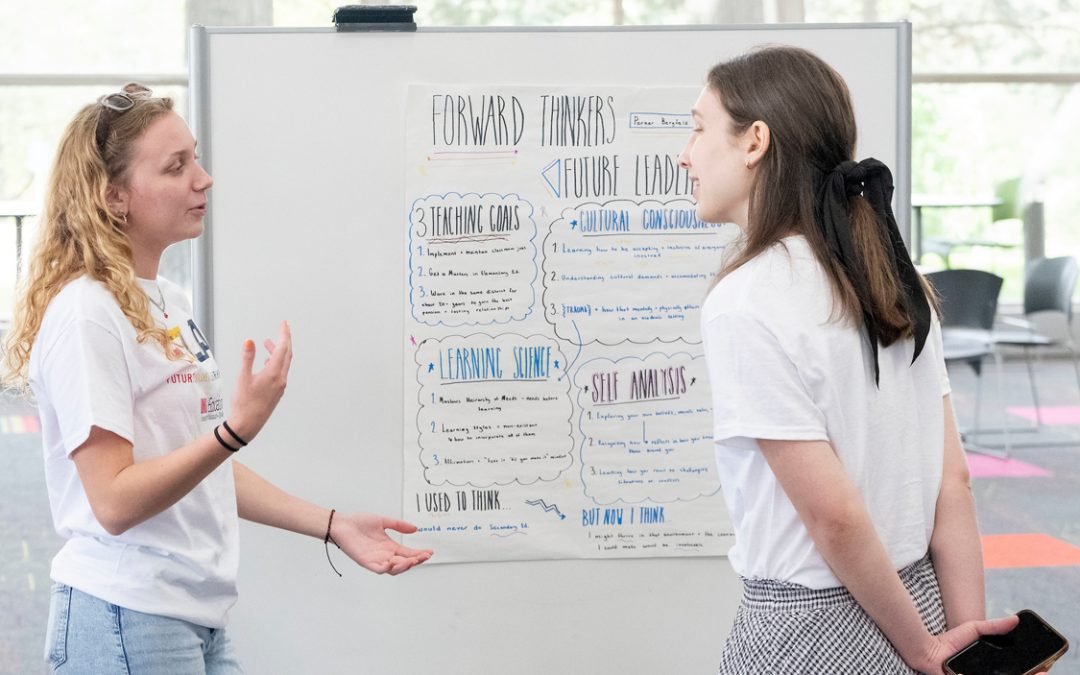
Camp Starfish participants experiment with handfuls of Oobleck. (Photos courtesy of Lynn Navin)
Over a span of two weeks during the summer, University of Missouri–St. Louis education faculty and undergraduates coordinated Camp Starfish, a program that offered coconut bowling, oobleck, traditional garifuna dance, gak and yoga lessons to a group of 28 special needs students on the Belizean island of San Pedro.
According to Lynn Navin, director of the University Child Development Center at UMSL, Camp Starfish represents a positive and dynamic shift toward the education of special needs students in Belize.
“There isn’t a national education system for children with special needs in Belize,” she said, “so they usually don’t go to school. Or if they do go to class, they sit at the back and don’t receive instruction.”
Besides working to understand complex cultural differences, Navin and the crew of education undergraduates used quick thinking and teamwork to meet challenges and provide Camp Starfish students with the best experience possible.
“Our special needs children had a wider age range and variety of challenges than expected,” she said. “Some students were vision and hearing impaired. Many students had Down Syndrome, and there were four or five children who had severe behavioral problems or autism, so we had to improvise sensory activities to accommodate them and help sooth their anxiety. Our team filled buckets with sand from the beach and hid figurines for the children to find and combined cornstarch and water to make oobleck. The kids were fascinated and had a lot of fun.”

UMSL education major Miranda Linstruth teaches Camp Starfish participants an original “lobster” song.
Miranda Linstruth, who is majoring in education with an emphasis in early childhood and special education, welcomed the opportunity to study abroad, experience a different culture and apply her teaching skill set.
“I chose to go on this trip because I knew the experiences I would have and the memories I would make would stay with me throughout the rest of my life,” she said. “I want to work with young children with special needs, and I thought this would be a great way to expose myself to the different education systems of the world. As someone who works with young children with autism spectrum disorders, I’ve seen how much intervention and support can turn a child’s life around.”
The effort and attention Linstruth, Navin and their colleagues put into practice at Camp Starfish was apparent in the variety of activities and adaptive pedagogy they used to reach special-needs students. Linstruth in particular found that children learn the most when keenly engaged.
“I used lobsters and manatees as themes for our activities,” she said. “I implemented a lobster song and game for one of our stations, and I was surprised by how quickly the campers picked up on it. The game consisted of learning a lobster song and having one person walk around the circle of campers as they sang. When they got to the word ‘Snap!’ the person walking around the circle would stop, and whoever they stopped in front of was who got to go around the circle next. Then I came up with ‘lobster says,’ which they all loved.”
Reflecting back on the experience, Linstruth is even more motivated to improve the quality of education for special-needs students at home and aboard.
“I know there was so much more we could have given these campers, but all the smiles and laughs I heard from everyone tells me that they were more than happy with what we could give them. Rome wasn’t built in a day and special education in San Pedro will still go on.”
Camp Starfish ended with a golf cart parade, celebration and speech from Kim Simpliss Barrow, the wife of the prime minister of Belize.
“Parents who have children with special needs tend to hide them and be ashamed of them,” Navin said, “so the prime minister’s wife talked about how we need to support these children, and that’s what the parade was all about — awareness and acceptance.”















